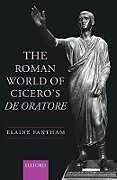The Roman World of Cicero's de Oratore
Einband:
Kartonierter Einband
EAN:
9780199207732
Untertitel:
Englisch
Autor:
Elaine Fantham
Herausgeber:
OUP Oxford
Anzahl Seiten:
366
Erscheinungsdatum:
07.12.2006
ISBN:
0199207739
A wide introduction to Cicero's political and cultural world, illustrating, by its analysis of his imaginary dialogue between statesmen, how he introduced the principles of Greek philosophy and rhetoric into Roman education, so that his work became the basis of humanist ideals in the Renaissance and Enlightenment.
Provides an introduction to Cicero's political and cultural world, illustrating, by its analysis of his imaginary dialogue between statesmen, how he introduced the principles of Greek philosophy and rhetoric into Roman education, so that his work became the basis of humanist ideals in the Renaissance and Enlightenment.
With her usual astute scholarship, Fantham has presented a cogent, illuminating analysis of the dialogue within the context of the failing senatorial government of the late republic. Her analysis is as important for understanding Cicero and his era as it is for understanding the practice of oratory, rhetoric in Rome, and the training of the orator/statesman.... This is a significant contribution to the understanding of Cicero, his dialogue, and his world. Highly recommended.
Autorentext
Elaine Fantham is Giger Professor of Latin Emerita, Princeton University.
Klappentext
The Roman World of Cicero's De Oratore aims to provide an accessible study of Cicero's first and fullest dialogue, on the ideal orator-statesman. It illustrates the dialogue's achievement as a reflection of a civilized way of life and a brilliantly constructed literary unity, and considers the
contribution made by Cicero's recommendations to the development of rhetoric and higher education at Rome. Because Cicero deliberately set his extended conversation in the generation of his childhood teachers, a study of the dialogue in its historical setting can show how the political and cultural
life of this earlier period differed from Cicero's personal experience of the collapse of senatorial government, when the overwhelming power of the "first triumvirate" forced him into political silence in the last decade of the republic. After an introductory chapter reviewing Cicero's position on
return from exile, chapters include a comparative study of the careers of M. Antonius and L. Licinius Crassus, protagonists of the dialogue, a discussion of Cicero's response to Plato's criticisms of rhetoric in the Gorgias and Phaedrus, and his debt to Aristotle's Rhetoric, analysis of the
dialogue's treatment of Roman civil law, existing Latin literature and historical writing, Strabo's survey of the sources and application of humor, political eloquence in senate and contio, theories of diction and style, and the techniques of oral delivery. An epilogue looks briefly at Cicero's De
re publica and Tacitus' Dialogus de oratoribus as reflections on the transformation of oratory and free (if oligarchic) republican government by debate to meet the context of the new autocracy.
Inhalt
1: Cicero at Fifty
2: The Public Careers of L. Licinius Crassus and M. Antonius
3: Constructing the Dialogue: The Challenge of Plato
4: The Future Orator: Talent, Training, and the Choice of Model
5: The Orator and the Law
6: Oratory and Literature: The Spoken and the Written Word
7: Rediscovering Aristotelian Invention
8: Wit and Humour as the Orator's Combat Weapons
9: Political Persuasion: Senate and Contio
10: Style and Substance
11: Res Pervolgatae: Words and their Manipulation in Standard Rhetorical Theory
12: Into Action: The Orator as Public Figure
13: Epilogue: The Statesman and the State in De Oratore and After

Leider konnten wir für diesen Artikel keine Preise ermitteln ...
billigbuch.ch sucht jetzt für Sie die besten Angebote ...
Die aktuellen Verkaufspreise von 6 Onlineshops werden in Realtime abgefragt.
Sie können das gewünschte Produkt anschliessend direkt beim Anbieter Ihrer Wahl bestellen.
Loading...
Die aktuellen Verkaufspreise von 6 Onlineshops werden in Realtime abgefragt.
Sie können das gewünschte Produkt anschliessend direkt beim Anbieter Ihrer Wahl bestellen.
| # | Onlineshop | Preis CHF | Versand CHF | Total CHF | ||
|---|---|---|---|---|---|---|
| 1 | Seller | 0.00 | 0.00 | 0.00 |
